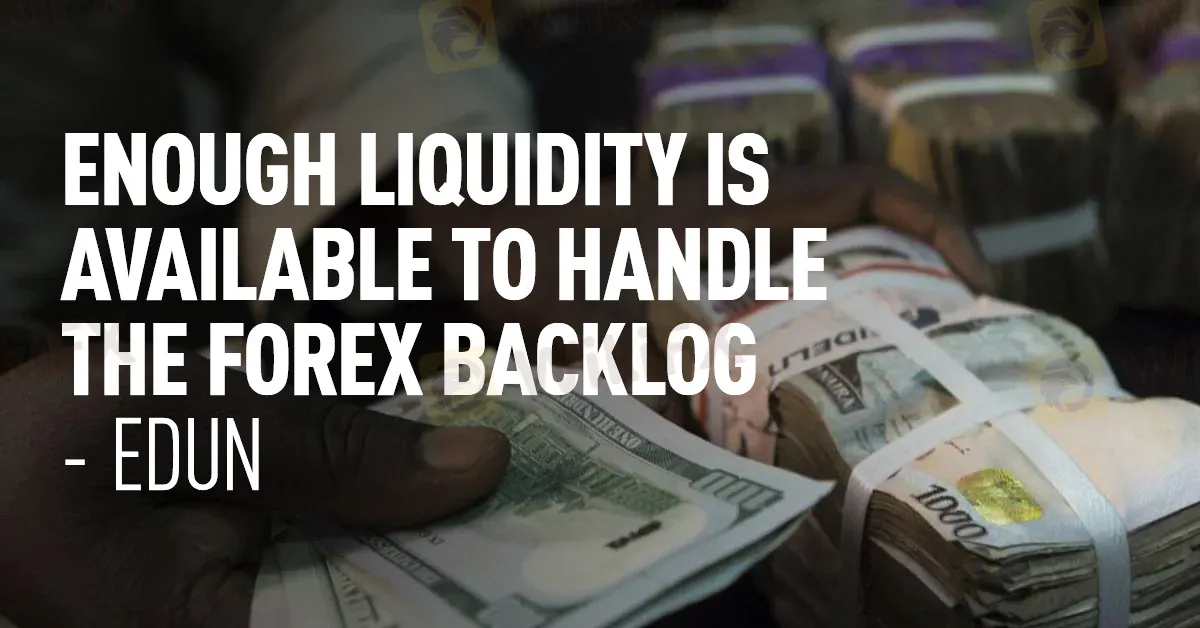简体中文
繁體中文
English
Pусский
日本語
ภาษาไทย
Tiếng Việt
Bahasa Indonesia
Español
हिन्दी
Filippiiniläinen
Français
Deutsch
Português
Türkçe
한국어
العربية
ENOUGH LIQUIDITY IS AVAILABLE TO HANDLE THE FOREX BACKLOG- EDUN
Abstract:Mr. Wale Edun, the Finance and Coordinating Minister of the Economy of Nigera, has guaranteed that there will be enough liquidity in the banking industry to lower the backlog of foreign exchange (FX).

Mr. Wale Edun, the Finance and Coordinating Minister of the Economy of Nigera, has guaranteed that there will be enough liquidity in the banking industry to lower the backlog of foreign exchange (FX).
In an interview with Bloomberg on Wednesday, Edu stated that the Central Bank of Nigeria (CBN) is working to reduce the foreign exchange backlog, which stands at approximately $5 billion.
The government thinks it can pay down the backlog almost immediately, so he said there should be a method for the banks to help with the backlog, either on a spot or a forward-rate basis.
He stated, “There should be a way to get the banks to actually help with that backlog, either on a spot or a forward-rate basis. There is actually liquidity within the banking system.”
“We think that the backlog can be nearly cleared in one fell swoop if we utilize the available funds.”
The minister expressed confidence that it could be resolved quickly if efforts to increase oil revenue and mobilize resources that are now in the economy are successful.
When asked about the government's proposal to borrow $1.5 billion from the World Bank, Edun replied that the government's changes deserve financial support from the Bretton Woods institution.
“We anticipate receiving $1 billion or $1.5 billion from the World Bank,” Edun went on to say.
“Although it is still up for debate, we believe that because we are pushing through with our reforms, we will receive support. ”We should be applauded for our efforts to modernize the foreign currency market and reduce gasoline subsidies. We should obtain our reward right now because we have done enough.
Additionally, Edun expressed the nation's confidence in its ability to access the Eurobond market, noting that preparations are in place to do so later this year should interest rates drop enough.
He continued, “We have been informed by the book runners and major issuers that Nigeria ought to have a window in the Eurobond market.”
The finance minister stated that the government intends to use all available liquidity in order to stabilize the naira.
“The main goal is to stabilize the naira, which entails bringing in more liquidity, primarily from oil revenue,” stated Edun.
Additionally, we want to make sure that we have access to Nigerian savings, namely local dollar savings from both inside and outside of the official market. The Nigerian economy has a lot of money.
The naira, the currency of Nigeria, and the foreign exchange market have both experienced volatility since the unification of the exchange rate windows.
Businesses have been impacted by the naira's inability to meet importers' and exporters' needs during transactions because of the scarcity of dollars in the foreign exchange market.
Through the implementation of strategic reforms, the federal government and the apex bank have attempted to revitalize the economy.
The federal government has boosted oil production, renovated the Port Harcourt refinery, and assisted the Dangote refinery in its operations as a means of achieving economic stability.

Disclaimer:
The views in this article only represent the author's personal views, and do not constitute investment advice on this platform. This platform does not guarantee the accuracy, completeness and timeliness of the information in the article, and will not be liable for any loss caused by the use of or reliance on the information in the article.
Read more

WikiFX "3·15 Forex Rights Protection Day" – Official Release of the Blacklist
WikiFX, as a globally leading forex investment ecosystem service platform, has always been committed to providing fair and authoritative broker verification services for forex investors, while offering solid rights protection support for every victim of forex investment. On February 26, 2025, WikiFX once again launched its annual "3·15 Forex Rights Protection Day" event, aiming to empower forex investors to speak out and defend their rights through open, transparent, and robust means.

Nigeria’s Oil and Gas Sector Gains Momentum
Nigeria’s oil and gas industry is experiencing a surge in investment, fueled by policy reforms and international collaboration, paving the way for continued energy expansion.

The Global Tariff War Escalates: Who Suffers the Most?
The global trade war is intensifying as countries continue to raise tariffs, aiming to protect their own economies while creating greater market uncertainty. In this tit-for-tat game, who is truly bearing the brunt?

Immediate Edge Review 2025: Is it safe?
Launched in 2019, Immediate Edge claims to be an automated cryptocurrency trading platform using AI technology for crypto trading services. The platform requires a minimum deposit of $250 to begin trading, which is relatively expensive for many investors. During its short operation, Immediate Edge failed to establish a positive reputation. The platform has undergone frequent domain changes and has repositioned itself as an intermediary connecting users with investment firms—a move that appears designed to obscure its actual operations. Immediate Edge restricts services to investors from the United States; it remains accessible to users in other regions.
WikiFX Broker
Latest News
FINRA Panel Orders Stifel to Pay $132.5M for Misleading Investors
The Future of Trading is Here: How AI is Reshaping the Market Landscape
Nigeria’s Oil and Gas Sector Gains Momentum
How to Avoid Risks from Scam Brokers in Forex Investment
Gold Price Hits Record High Amid Economic Uncertainty and Policy Shifts
Could DeepSeek Be Linked to a $390 Million Fraudulent U.S. Server Deal?
Ripple Secures Dubai License: First Blockchain Payments Provider in DIFC
BSP Restricting Offshore Forex Trades to Control Peso Volatility
Retiree Loses RM2.33 Million in Investment Scam – Could You Be Next?
Will Trump's Trade Policies Fuel Inflation? BlackRock Warns of Economic Risks
Currency Calculator






